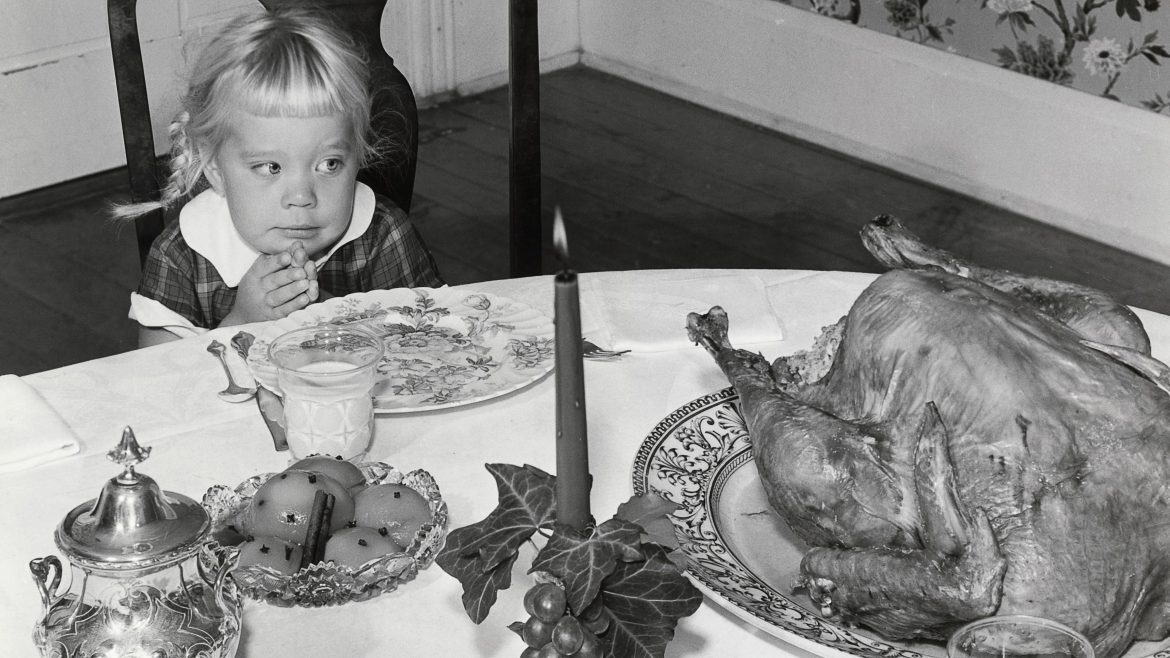There’s a fairy tale about Thanksgiving that gets refuted every fall. Does eating turkey really make you fall asleep? When science writers check in with the experts, they always get the same response: No, no, no, and no. Also no and no.
These holiday debunkers tell you what the science says: Turkey meat is not a sedative. They tell you what the studies show: Drumsticks don’t produce fatigue. And then they take another step, however ill-advised: They lay out different reasons Thanksgiving dinner might be sleep inducing. Even as these stories bust the turkey-coma myth, they end up replacing it with other fables.
The trouble began nearly half a century ago. It started with warm milk—a sleep aid that was the subject of its own lightly flavored brand of science journalism. Was it true that a mug of milk could help you go to sleep? Yes, the experts said, because milk has tryptophan! This one amino acid worked something like a natural “sleeping pill,” a psychiatry professor told The New York Times in 1983. “Once again,” the Times said, “an old wives’ tale, the one about warm milk before bedtime, has received scientific support.”
Indeed, a tryptophanic fever was about to spread across America. By the end of the decade, tryptophan was being widely sold in supplements as a treatment for insomnia; an aid for beating jet leg; and also a fix for depression, PMS, and drug dependence. (Tryptophan was even talked about as a suicide preventive.) To explain its wondrous potency, scientists noted that when tryptophan made its way into the brain, it could be converted into the neurotransmitter serotonin. According to the thinking of the time, serotonin was the molecule of relaxation and well-being. Early studies seemed to show that it led to sleep.
Turkey, too, contains some tryptophan. Thus the sleepy-turkey myth was born. But even from the start, experts knew the theory had some complications. In the first place—as every Thanksgiving-myth-debunking article notes—turkey doesn’t have a lot of tryptophan. In fact, almost every other kind of meat has more. One serving of turkey breast contains 244 milligrams of tryptophan; one serving of clams contains 243. You’ll get less tryptophan from turkey, ounce for ounce, than you will from octopus or cheddar cheese. And in the second place, even taking high-dose tryptophan supplements doesn’t seem to do so much for sleep. (In 2017, the American Academy of Sleep Medicine recommended against the use of tryptophan as a treatment for insomnia on account of its “absence of demonstrated efficacy.”)
If only that could be the end of it. The early experts on the topic had laid out some other dietary theories of ensleepification. Tryptophan was soporific, the MIT neuroendocrinologist Richard Wurtman and his colleagues said, but its effects were limited by the degree to which it crossed the blood-brain barrier. Other nutrients from foods could get in its way. But Wurtman, who died in 2022, found that when you ingest a bunch of carbohydrates, the resulting spike of insulin can shunt away the amino acids that normally compete with tryptophan. As he saw it, carbs have a “sedating effect” in the human diet, by helping tryptophan to make its way from the gut into the brain. If it seemed as though a mug of warm, protein-rich milk was helping people get to sleep, that’s because they must also have been eating cake.
Wurtman was already floating this idea—let’s call it the sleepy-carbs hypothesis—in the early 1980s, and it has been repeated in the press ever since. Almost all articles about the turkey-coma myth now point at carbohydrate-heavy side dishes, the sweet potatoes and the pie, and claim that these Thanksgiving foods, not the turkey, really knock you out.
This merely swaps one highly suspect notion for another. Studies find that meals with lots of carbohydrates don’t really make you sleepy. (They may have some small effects on how you sleep, such as an increase in the time you spend in REM, the dreaming phase.) More to the point, the old idea that serotonin is a simple, sleep-promoting signal in the brain is fully out of fashion; later research found that serotonin may also be a potent source of wakefulness, and that its function in the sleep-wake cycle is both complicated and diverse.
Nutritionists may now be more inclined to look at melatonin, a hormone that is synthesized (like serotonin) from dietary tryptophan. One line of research looks at whether sour cherries or beefsteak tomatoes might be useful as a sleep aid, because these foods are known to be rich in naturally occurring melatonin. When taken as a supplement, melatonin seems to have a small effect on sleep onset and sleep quality; when taken as a tomato, it may also have some benefits. That said, the American Academy of Sleep Medicine recommends against the use of melatonin as a treatment for insomnia for a similar reason that it recommends against tryptophan: insufficient evidence of clinically meaningful results.
In short, all the science here is pretty weak. Yet the turkey-myth debunkers pile on the speculations. The sleepy-carbs hypothesis is just the start. What accounts for post-Thanksgiving lethargy? Many experts blame the fact that we’re consuming so much food, and overeating makes you tired on its own. (Some even cite the old-fashioned and unlikely notion that heavy digestion deprives your brain of oxygen.) But the evidence that people are more inclined to fall asleep, for any reason, after pigging out—that they experience what’s known among the cognoscenti as “postprandial somnolence”—is equivocal, at best.
This is science—and this is science journalism—of the sort that only makes you dumber the more of it you read. Here are some other reasons you might feel tired after eating dinner on Thanksgiving: You have consumed some alcoholic beverages; you have traveled a long distance; you have gotten trapped in some exhausting conversation with your cousin’s wife. Also maybe this: Dinner time is over, and the sky is dark, and a lot of time has passed since the last time you were sleeping.
And allow me to lay out one final possibility: What if Thanksgiving dinner doesn’t even make you sleepy in the first place? Could the very basis for the turkey-coma myth, and for all of its debunkings, be a sham? I could find no data to suggest that the Thanksgiving-meal effect is real. “Nobody’s tested this,” Faris Zuraikat, a nutrition and sleep scientist at Columbia University, told me when I called him for this story. So here we are today, dressing up a folk belief about the holiday with pseudoscientific rationales. It’s a pointless and exhausting project. We should be thankful if it ends.

